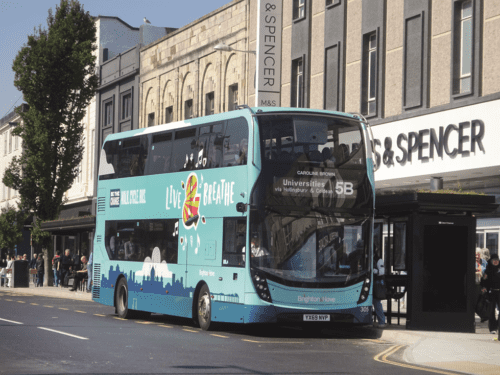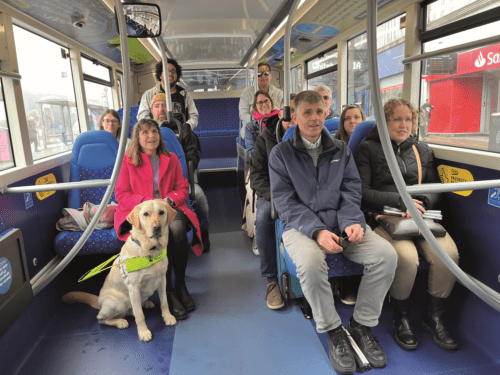
A new training resource has been created by a specialist charity to help drivers better understand the needs of passengers with visual impairments
UK charity the Thomas Pocklington Trust (TPT) and its volunteer-led Sight Loss Councils (SLCs) marked the end of Catch the Bus Month this September with the launch of a new approved training resource for bus and coach drivers to help deliver best practice customer service to blind or partially sighted passengers.
The Trust says the training, ‘Vision Impairment Awareness for Bus Drivers,’ has the potential to impact all bus and coach drivers across the country. The Confederation of Passenger Transport (CPT) has approved the materials for its members, and the Driver Vehicle Standards Agency (DVSA) also confirmed the content is suitable and meets conditions for Driver Certificate of Professional Competence (DCPC) training.
Blind and partially sighted volunteers created the training using first hand, lived experience of bus travel, working with Brighton & Hove Buses. The training is narrated by Paralympic gold medallist Lora Fachie OBE, a former Sight Loss Council member, and aims to build confidence and inform bus drivers on how to best support blind and partially sighted customers.
Research by the charity showed 65% of blind and partially sighted people cite access to public transport is a key issue that matters to them the most; in contrast, over half of people with a vision impairment say they find it difficult to navigate public transport facilities. In the training videos, Sight Loss Council volunteers explain how the bus driver is key to enable them to maintain their independence, and how they can make or break a journey.
SLC volunteer Linn Davies explains: “Due to my vision impairment, I can’t really drive or cycle, so I rely heavily on buses to get around quickly. I use the buses to go to work, to go shopping, and for leisure and social activities.
There aren’t really any railway stations near where I live and taxis are expensive, so buses are really a lifeline.”
Participants also explain how bus drivers can ‘See and Stop,’ then ‘Speak and Support,’ with examples such as seeing blind or partially sighted people at a bus stop and stopping, because they understand that if you cannot see the bus coming, then you would not know to flag it down, speaking to the passenger, giving the bus number and destination, and offering support, such as locating a spare seat and announcing arrival at their destination.
Sight Loss Council Engagement Manager Dave Smith said: “Buses are also an essential lifeline for blind and partially sighted people who cannot drive to get to work, see family and friends and socialise. Without accessible bus travel, many risk becoming isolated and cannot access the same life opportunities. Our goal is to make bus and coach travel accessible to all.

“Our training materials will be made available to all bus and coach operators and trainers across the UK. We are proud of our partnership with Brighton & Hove Buses, CPT, the Department for Transport, the DVSA and Bus Users UK to support bus drivers to best meet the needs of blind and partially sighted people across the country.”
DVSA Chief Executive Loveday Ryder added: “Making sure that bus drivers are fully trained to support passengers who are disabled is an important issue for DVSA. The visual impairments awareness driver training resource is an excellent tool to help improve bus drivers’ empathy and expertise when they interact with passengers who are blind or partially sighted.
“It’s great that DVSA, Thomas Pocklington Trust, CPT and Brighton & Hove buses have been able to work together to produce and promote this resource to the passenger carrying vehicle training industry. I’m sure it will help drivers and operators to meet the needs of their passengers, provide invaluable subject matter expertise to the driver training industry and help make bus travel more accessible for the many visually impaired passengers who rely on bus services in their daily lives.’’
Operations Director at the Confederation of Passenger Transport Keith McNally commented: “CPT welcomes the new training material, which will enhance the abilities of public service vehicle drivers to identify, assist and support our sector’s customers. Bus and coach operators can now utilise this training, which will complement their investment in wider accessibility measures and should enable blind and partially sighted people to have greater confidence when travelling on their local bus services.”
Ed Wills, Managing Director, Brighton & Hove and Metrobus, said of the programme: “These training films are a new and innovative way of demonstrating to drivers the vital role they play in supporting blind and partially sighted passengers. We are always striving to make bus travel as accessible as possible which is why we contributed to the making of these films.”
Claire Walters, Chief Executive of Bus Users UK, agreed: “Accessible transport is a lifeline for people, providing access to essential services, education and employment. This initiative is extremely welcome and will have a huge impact on passengers with sight-loss, enabling them to travel safely and with confidence.”
The new resources will also be available to CPT members via the CPT compliance manual from September 2024 and via the DVSA from November 2024. More information on the training programme can be found at sightlosscouncils.org.uk/Bus-Driver-Training.

